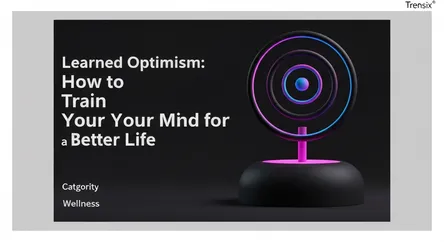Wellness
Learned Optimism: How to Train Your Mind for a Better Life

Discover learned optimism, the psychological concept that you can cultivate a positive mindset to improve resilience, health, and overall well-being.
What is it?
Learned optimism is a concept in positive psychology, developed by Dr. Martin Seligman, suggesting that we can cultivate a positive mindset. It is the opposite of "learned helplessness," where individuals believe they cannot change their negative circumstances. The theory posits that optimism is a skill that can be developed by consciously recognizing and challenging negative self-talk and pessimistic thoughts. By reframing how we explain setbacks to ourselves—viewing them as temporary and specific rather than permanent and pervasive—we can change our response to adversity from one of defeat to one of resilience.
Why is it trending?
As society places a greater emphasis on mental health and mindfulness, learned optimism has gained traction as a practical tool for building mental fortitude. It offers an actionable alternative to feelings of helplessness and is a core component of cognitive-behavioral therapy (CBT) used to combat depression. The idea that anyone can learn to be more optimistic is empowering and resonates with the growing interest in self-improvement and personal development. Its promotion as a way to enhance well-being and reduce vulnerability to depression has made it a popular topic in wellness circles.
How does it affect people?
Adopting learned optimism can significantly improve a person's life. Research shows that optimistic individuals tend to have better mental and physical health, including a stronger immune system and a longer lifespan. They experience lower stress levels, higher motivation, and greater success in their careers and personal goals. By changing their explanatory style, people can become more resilient in the face of challenges, bounce back more quickly from failure, and report a higher overall quality of life and well-being.